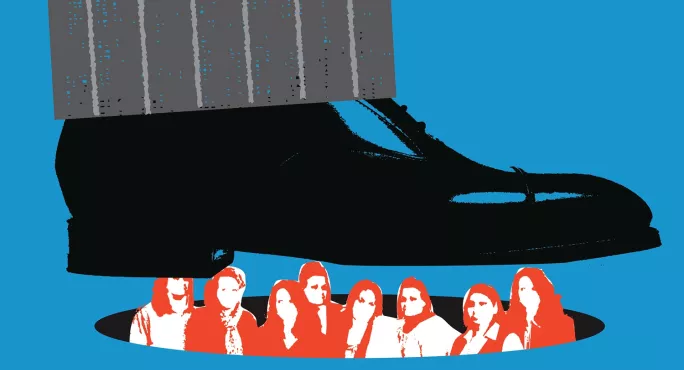- Home
- ‘Education has its own, less conspicuous “Presidents Club”’
‘Education has its own, less conspicuous “Presidents Club”’

I once got a teaching job at an unorthodox meeting in a service station. I’d met the principal informally on another occasion and we’d clicked. He’d asked if I’d read Guy Claxton. I said I had. I hadn’t. I asked him if he had any job opportunities in his school. He said he hadn’t. He seemed like a “great guy” and he clearly thought I was a “great guy”, too. In my blind confidence, in that M5 cafe, I suggested he create a job for me and he did. I suggested what he should pay me and he did.
Later, in post, I found out that it was significantly more than my female manager was being paid. I remember telling myself that I deserved it because I’d had the initiative to negotiate, and that it was a fair representation of my value. Fast forward a few years and I’m waking up to a radio report on sexist behaviour at the Presidents Club charity dinner, and aside from the vile misogyny and exploitative behaviour of the men involved, I’m furious at the exclusive access the event gave its grubby guests to David Meller and Nadhim Zahawi - both senior figures in education and apprenticeships.
I didn’t immediately see the parallel with me and the principal, glancing furtively around in the roadside Costa.
Challenge ‘annoying men’
In education, we must resist concentrating power in any exclusive group. The Presidents Club is hopefully an extreme, an outlier in society in general, but the presence of Meller and Zahawi mean we can’t be complacent. We have to examine the practices and habits and behaviours we see, ready to challenge our own “annoying men” whose groping rapaciousness is focused on our finances rather than young hostesses.
The group that I think represents the worst of the sector, and this is with the caveat that there are many noble and excellent exceptions, is consultants. Far too many are confident or arrogant men who didn’t make it in the classroom or in management, and who were rightly managed out to improve the experiences and chances of the children and young people we serve. But unlike in other professions, education seems to remain in thrall to these chancers. Even once they’re purged from a school or college, they find it relatively easy to pick up gigs leeching more money out of our dwindling coffers than they were ever awarded as a salary.
Part of this has certainly to do with teachers being so damn exhausted and overworked that it’s just easier to pay a blustering middle-aged man to fill a training day than it is to come up with something ourselves. But I think the persistence of so many poor edu-consultants in the face of a new generation of intelligent and dynamic speakers and researchers has to do with a legacy in teaching where a profession made up mostly of women has always historically been led by the few men who have disproportionately held leadership positions.
The “Presidents Club” in education are those who can’t even remember being at the chalkface, who aggressively market their vapid teaching philosophies all day while we are actually in classrooms, and who rely on the network of old male chums to throw them a cheque every once in a while. They have their greedy hands on our budgets while we naively auction off our students’ futures.
No shortage of female excellence
In FE, we can take some pride in challenging the club. There is certainly no shortage of female excellence in my college, where I continually feel like a shameful fraud surrounded by extremely capable women. Also, as a sector, we have a far higher proportion of female principals than schools or universities, although it’s still not quite equal and there’s work to do. I am hesitant to use simplistic gender stereotypes by way of explanation, but I do wonder, browsing the seven college-principal posts currently advertised on Tes, whether the five that are withholding salary information and simply stating “competitive” are likely to discourage reasoning, professional women who might reasonably want to know what their labour is worth, while encouraging roguish, overconfident men to try their luck.
There is a lot of evidence to show that women do not benefit from negotiable salaries. The need for transparency in working towards true equality is obvious and large employers, such as colleges, have a duty to lead the way with fair and open pay. After all, it was closed doors and secrecy that kept the Presidents Club running for 33 years.
That headteacher, in the M5 Costa Coffee, was a genuinely good human being. I can’t in clear conscience compare him to the tuxedoed detritus that attended an event where the programme had to advise guests not to sexually harass young women. He certainly wouldn’t have been the type to have clandestine meetings with women in service stations. Which is exactly why my appointment was wrong and sexist; it was a “men only” opportunity. And if we want the rest of society to adopt a better attitude towards women, we had better start by modelling it in education.
Andrew Otty leads 16-19 English in a South West college. He tweets @Education720
Want to keep up with the latest education news and opinion? Follow Tes FE News on Twitter, like us on Facebook and follow us on LinkedIn
Keep reading for just £1 per month
You've reached your limit of free articles this month. Subscribe for £1 per month for three months and get:
- Unlimited access to all Tes magazine content
- Exclusive subscriber-only stories
- Award-winning email newsletters



